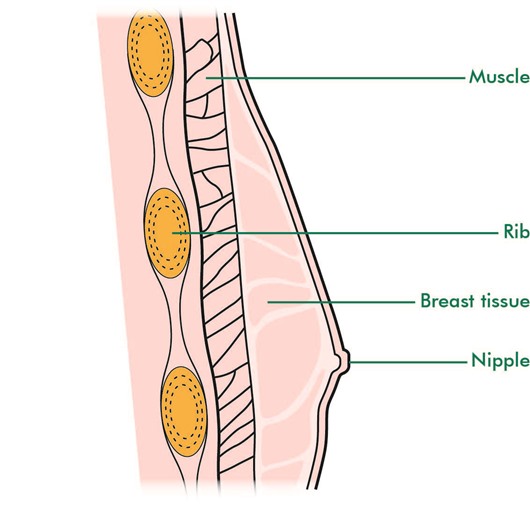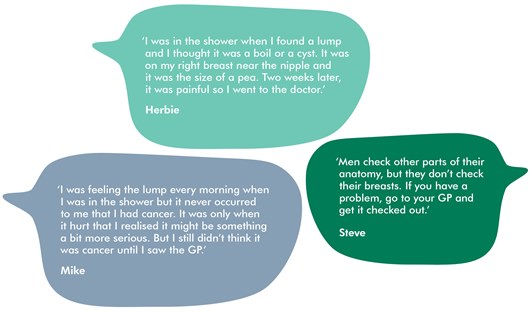As part of Breast Cancer Awareness Month this October, we are taking the chance to raise awareness of breast cancer in men. In this blog, written by editor Elissia, we explain more about how breast cancer can affect men.
Breast cancer in men
Many people don’t know that men can get breast cancer. They probably don’t think that men actually have breast tissue.
But men do have a small amount of breast tissue behind their nipples. Breast cancer can develop in this area. Each year, around 390 men are diagnosed with breast cancer in the UK.
Cross section of the male breast

What causes breast cancer in men?
The causes of breast cancer in men aren’t fully understood yet. But there are some things that can increase a man’s risk of developing it.
These risk factors include:
It’s important to remember that breast cancer in men is rare, and most men who have these risk factors will never develop it. But if you are worried, talk to your GP.
What are the symptoms?
The first thing you might notice is a painless lump under the nipple. Other symptoms may include:

If you notice a change to the way your chest looks or feels, you should see your GP straight away. The earlier breast cancer is diagnosed and treated, the more successful treatment is likely to be.
Are there different types of breast cancer?
Yes, there are different types of breast cancer. The two main types are:
Where can I get more information and support?
You can read more about breast cancer in men in our booklet Understanding breast cancer in men. We also have information about breast cancer on our website.
You can call our cancer support specialists on 0808 808 00 00, or you could visit our Online Community to talk to other people affected by cancer and get support.
To see what else Macmillan's cancer information team has been blogging about, please visit our blog home page! You can subscribe to receive our blogs by email or RSS too.
We're with you every step of the way
The Macmillan team is here to help. Our cancer support specialists can answer your questions, offer support, or simply listen if you need a chat. Call us free on 0808 808 00 00.
Comments? Feel free to add them below (you need to be logged in).
Keep in touch Follow Macmillan’s cancer information team on Twitter @mac_cancerinfo
Whatever cancer throws your way, we’re right there with you.
We’re here to provide physical, financial and emotional support.
© Macmillan Cancer Support 2025 © Macmillan Cancer Support, registered charity in England and Wales (261017), Scotland (SC039907) and the Isle of Man (604). Also operating in Northern Ireland. A company limited by guarantee, registered in England and Wales company number 2400969. Isle of Man company number 4694F. Registered office: 3rd Floor, Bronze Building, The Forge, 105 Sumner Street, London, SE1 9HZ. VAT no: 668265007